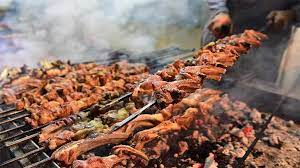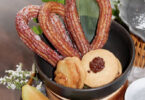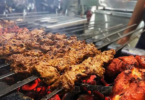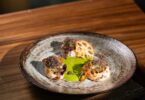F.P. Report
PESHAWAR: The Khyber Pakhtunkhwa province, which is well-known for its diversity of culture has also been acclaimed internationally for its mouth-watering food cuisines mostly brought by the invaders, kings and developed by the people, who later settled in the region.
Known as a land of hospitality, rich cultural heritage, snow-clad mountains peaks and Buddha Era’s relics, KP being a gateway to the Central Asian Republics (CARs) is known to international and domestic travelers but the painting of its historical importance would remain incomplete without mentioning the master strokes of its traditional cuisines.
The famous Chapli Kabab of buffalo meat, lamb Karahi cooked in pure lard, Penda of southern districts including DI Khan, Bannu and Lakki Marwat, slowly cooked beef roush and Kabuli pulao (rice) mostly introduced by foreigners, kings and warriors, who stayed here before marching to the subcontinent via historic Khyber Pass, attracts foodies due to its delicious taste and high energy ingredients.
Renowned food Vbloggers of world fame, Mark Weins of food channel Migrationology and Tevor James of Food Ranger having millions of subscribers also visited Peshawar where they enjoyed the traditional cuisines including Chappli Kabab, Matton Karahi and juicy lamb meat at Namak Mandi, a historic food street of Peshawar.
The famous dish is fried in a specially designed pan prepared in pure animal fat that gives special aroma, salty taste and flavor to cuisine savored by food lovers. Almost every city of the province and bazaars of Pakistan have abounded cuisines shops where Chapli Kabab is prepared with minced buffalo meat of buffalo and special ingredients and spices on firewood in a cozy environment.
The origin of Chapli Kabab is unknown, however, Qari Javed Iqbal writes in his book ‘Saqafat Sarhad Tarikh Ke Ayeene Me’ (Frontier culture in the mirror of history) that Mughals, Turkish, Ghaznis and Afghans, who invaded subcontinent through historic Khyber Pass, had preferred meat in their dishes that led to the introduction of Chapli Kabab in Khyber Pakhtunkhwa.
Qari Javed writes that Chapli Kabab’s shops was found at Karimo Kababi in Nothia, Jalil Kababi, Mohmand Tore Kabai in Firdous Bazaar, Tarojaba Kebabi on Grand Trunk Road and Bakhshi Pul at Peshawar where travelers enjoyed its delicious bites before marching to Indo-Pak subcontinent for trade and business.
Haji Hazrat Ullah, the owner of Mohmand Toray Kabab at Firdos bazaar Peshawar told APP that people from across the country come here to eat Chapli Kabab especially during winter due to purity of meat and delectable taste besides freshness of components being used in its preparation.
Despite the introduction of many western foods and snacks’ varieties, he said the popularity of Chapli Kababs has not decreased in the province where its demand was increasing with each passing day especially during the winter.
‘Mutton Karahi’ also known as Karhi Ghost, Dumba Karahi, Balti Ghost and Dumpukhat Karahi in different provinces also attract foodies owing to its palatable taste of lamb fat and minimum use of spices except salt and green chilies. Food lovers are seen chomping on and hogging on lamb meat immersed in finger-licking lamb fat in the Namak Mandi’s restaurants.
“What would be more enjoyable other than to eat lamb meat cooked in its own fat on coal at Namak Mandai during present cold weather,” said Imtiaz Ahmad Siddiqui (58), who was standing for its turn for a parcel at a local hotel at Namak Mandi here.
“In adolescence, I frequented to Landikotal with family members to eat lamb Karahi that was slow-cooked on medium flame of firewood ”, he said and maintained that “my taste buds still remember that flavor but restaurants of Namak Mandi also offer lamb karahi with the same taste that reminisced me of my teenage.”
Kachalo Paira is another traditional dish that is eaten widely in provincial metropolises and the province’s bazaars. The dish is sold in almost every bazaar of the province and eaten by people due to its own specific savory taste and affordable price.
Kachalo is a kind of calocasia bulbous root that is boiled, peeled and mixed with vinegar, red pepper, lemon juice and served with sauce prepared with tamarind, mint and yogurt. The ancestry of the dish, which is simple, is unknown but it is among favorite among food items of Peshawarites and local Pashtun population.
“My father started selling Katchalo Paira in Karimpura bazar on a pushcart from 1981 and after him I started serving people in the same locality to earn two times bread for his family,” said Muhammad Sulaiman alias Jani while talking to APP.
“Although this traditional food is known to only old dwellers of the province, the younger generation also relish it due to its tangy and spicy taste.” He said the species has also made deep inroads in Attock Punjab due to its unique taste and health benefits.
“The dish is best to rejuvenate taste buds of a patient after recuperation from a disease,” he said, adding a patient often lost sense of taste after eating medicines during illness and Kachaloo Paira can return his lost sense of taste besides increasing production of digestive juices due to tanginess of flavor induced by spices including tamarind, tinge of vinegar and homemade spices.
Muhammad Muzammil (14), who was eating Kachaloo at the push cart at Karimpura said that he has been eating the dish since childhood and still loves it due to its unique spicy taste.
Chicken penda and traditional sohan halwa (sweet) food of DI Khan also attract foodies and guests in droves, adding “our hospitality program can’t complete without chicken penda and later offering sohan halwa to them,” said Tariq Marwat, a resident of DI Khan.
Shah Rukh Ali Khan, Director General KP Food Safety and Halal Authority said quality of foods was being monitored in bazaars including Namak Mandi through specialist staff and food testing laboratories to ensure quality food services to consumers.
“Our mobile food testing laboratories are equipped with high-tech testing equipment with an ability to test quality of over 20 food items on the spot,” he said, adding no compromise was being made on hygienic conditions of the kitchens of food restaurants. (APP)







